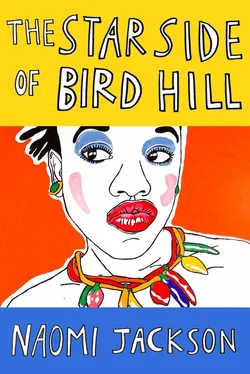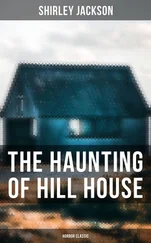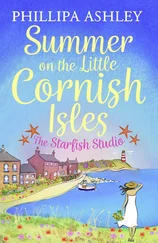Naomi Jackson - The Star Side of Bird Hill
Здесь есть возможность читать онлайн «Naomi Jackson - The Star Side of Bird Hill» весь текст электронной книги совершенно бесплатно (целиком полную версию без сокращений). В некоторых случаях можно слушать аудио, скачать через торрент в формате fb2 и присутствует краткое содержание. Год выпуска: 2015, Издательство: Penguin Press, Жанр: Современная проза, на английском языке. Описание произведения, (предисловие) а так же отзывы посетителей доступны на портале библиотеки ЛибКат.
- Название:The Star Side of Bird Hill
- Автор:
- Издательство:Penguin Press
- Жанр:
- Год:2015
- ISBN:нет данных
- Рейтинг книги:5 / 5. Голосов: 1
-
Избранное:Добавить в избранное
- Отзывы:
-
Ваша оценка:
- 100
- 1
- 2
- 3
- 4
- 5
The Star Side of Bird Hill: краткое содержание, описание и аннотация
Предлагаем к чтению аннотацию, описание, краткое содержание или предисловие (зависит от того, что написал сам автор книги «The Star Side of Bird Hill»). Если вы не нашли необходимую информацию о книге — напишите в комментариях, мы постараемся отыскать её.
Dionne spends the summer in search of love, testing her grandmother's limits, and wanting to go home. Phaedra explores Bird Hill, where her family has lived for generations, accompanies her grandmother in her role as a midwife, and investigates their mother's mysterious life.
When the father they barely know comes to Bird Hill to reclaim his daughters, and both Phaedra and Dionne must choose between the Brooklyn they once knew and loved or the Barbados of their family.
The Star Side of Bird Hill — читать онлайн бесплатно полную книгу (весь текст) целиком
Ниже представлен текст книги, разбитый по страницам. Система сохранения места последней прочитанной страницы, позволяет с удобством читать онлайн бесплатно книгу «The Star Side of Bird Hill», без необходимости каждый раз заново искать на чём Вы остановились. Поставьте закладку, и сможете в любой момент перейти на страницу, на которой закончили чтение.
Интервал:
Закладка:
“What frighten you?” Hyacinth asked.
“I don’t want to go in there with all those dead people.” All summer, Phaedra had run and jumped and played among the gravestones, but now, with her mother buried there and her grandmother beside her, things felt different.
“So you think if you don’t walk in there, you won’t see dead people? Do you know how many spirits we passed on the road between our house and here? Before time, people used to bury their family in their backyards so they could go talk to them whenever they want.”
“It’s different, though. I know someone dead now.”
“Even better, then. You’ll have more to say. And someone to help you from the other side.”
Phaedra hesitated, but then quickly followed her grandmother once she realized it was better to keep walking with Hyacinth than to be left alone.
They made their way toward Avril’s grave, which was positioned in a way so as to receive the full light of the moon. A fresh bouquet of Avril’s favorite hibiscus sat at the head of the plot. Phaedra and Hyacinth admired the flowers and then sat on the ground, which was damp and still slightly raised. There had been no money for a tombstone, just a small cross made of poured concrete, with Avril’s name and dates of her birth and death. It cost Hyacinth a small fortune and the indignity of begging a distant cousin to make the cross at a deep discount. But she thought that Avril deserved at least this.
Phaedra sat at the edge of her mother’s grave, boring her eyes into the cross as if by deciphering the numbers and letters she might crack the code of why and how she’d died. Phaedra remembered what her grandmother had told her about Avril’s suicide. But this image, of a woman brave enough to take her life, didn’t match up with the mother Phaedra had left in Brooklyn. A lot had changed in the last few years, when Avril had gone from being a woman who was vibrant and full of life, writing children’s books for Dionne and Phaedra, taking them to every free event she could, making elaborate birthday celebrations for them, to someone else, someone dull and slow moving, burdened by the world. Maybe this woman could have killed herself, although Phaedra suspected that in the end her sadness wouldn’t have allowed her to go through with something so terrifying as jumping in front of a train. Phaedra remembered how tightly Avril held her hand when they stood waiting at the Sterling Street subway station, how many times Avril warned her not to ever walk between the cars. Still, so much had changed about Avril in the last few years, and Phaedra considered that the Avril who’d waved good-bye to her and Dionne at JFK airport in her slippers might be capable of doing anything that she thought might relieve her pain.
Phaedra held out hope that the end of summer might wipe clean the slate of what had come before, that one morning she would wake up and still have her mother and her sister, be back in Brooklyn, and none of the bad things that summer brought would be true anymore. In this moment, Phaedra felt as far as possible from this vision of the future as she could possibly be. She dug her hand into the dirt and felt her mother there, and some part of her ached less violently than before. With an anchor to the land, she felt steadier, safe.
“So what do we do now?” Phaedra asked. Her grandmother was bathed in the pale brilliance of the moonlight and starlight. Phaedra looked at Hyacinth’s face, the lines around her mouth and forehead that had deepened from creases into valleys in the weeks since Avril’s passing. Phaedra thought then, though she’d never thought it before, that her grandmother had been beautiful once, and was now too.
“Nothing to be done different now than if your mother was standing in front of you.”
“But she’s not!” Phaedra shouted. She looked down into her lap, at the way that the front and back of her palms were almost the same color now, equally coated in dirt.
“I know that, Phaedra, I know. Come,” Hyacinth said, and stretched open her arms. Phaedra went toward the now-familiar musk and starch of her grandmother’s clothes.
“Cuhdear. You need something to loosen your tongue and say the things that need saying. You hold on too tight to something that you don’t need and your hands won’t be open for the thing that you most need when it comes along.”
“But I don’t know how.”
Hyacinth reached into the white canvas bag slung over her shoulder and pulled out a flask. She tipped a bit of the liquor onto her index and middle fingers, and then pressed them to Phaedra’s tongue.
“Now, speak, child. Talk as if everything you want to say can be heard.”
Phaedra dug her knees into the earth and stared at the swirl of dates and names to which her mother’s life had been reduced. When she felt her words come, she spoke.
“Mommy, I don’t know what happened to you. One day we were getting ready to get on the plane, running around trying to find this and that and you were running behind us, telling us not to forget our toothbrushes, and our sweaters for the cold nights. When we didn’t hear from you, we thought that maybe that meant you were so busy getting your life together that you didn’t have time to call us or to write. Mr. Jeremiah says that you can’t be living your life and talking about living your life at the same time, that if you are, it’s not really living you’re doing. So we thought maybe that’s what you were doing, living. But then I realized that wasn’t what you were doing at all, that while we were running around here and playing and getting in trouble, you were back in Brooklyn, and moving further and further away from us. You were dying there. And once you were dead, there was nothing we could do to bring you back to us. Well, not alive, anyway. When I was little, you used to laugh at the same knock-knock jokes I told you over and over again, and you’d laugh every time as if it were the first time. What I’ve wanted to tell you all this time more than anything is that I forgive you. And that I understand why you might have had to leave us. Granny’s teaching me a lot of things. I bet some of the things you don’t even know. And Dionne, well, Dionne is Dionne. She ran away with Daddy, and I just want her to be back here with us, so it could be the three of us again. Or the four of us, really, because I still count you even though you’re not exactly with us. Mommy, I’m not sure if you can hear me. Or what you might be able to do if you can. But if you can, if there’s something you can do about it, please send her back to us.”
Phaedra was close to the headstone now, her ear pressed to the cool earth, her head just above where she thought her mother’s head might be. She stayed there for a while, listening for the sound of Avril below the hill. She would have stayed longer, had Hyacinth not nudged her and told her it was time to go home.
~ ~ ~
ASK A BAJAN where their navel string is buried and you will get as many answers as people you ask, and all of them will have to do with home. Hyacinth, while a believer in the medicine that her mother and grandmother had passed down to her, also knew that there was more than one way to skin a mongoose. So, after she and Phaedra called on Avril to help them, she decided to turn over one last stone. Whenever she needed something, it was nothing for Hyacinth to drop in on someone she had delivered, and find them either in their garden or in their house, at their work site or in their office. And even if they were a big man or a big hard-backed woman, there was none that could resist doing a favor for the woman who had seen their naked bottoms before even their mothers, who had bound their bellies and given them a tether to this world.
So on the second day Dionne was missing, while everyone else was busy putting the final touches on their costumes for Grand Kadooment Day, flapping their mouths about which man or which woman they would be working up on while they went down Spring Garden, finalizing their party plans, stirring batches of rum punch with heavy hands, Hyacinth paid a visit to Inspector Joseph. The inspector was a burly man whose grumbling so thoroughly frightened his subordinates into doing their work that he’d built a reputation for running the most efficient police station on the island and become the go-to man for anything criminal in Barbados. Never mind that Hyacinth hadn’t seen the inspector since he was wearing short pants and going to Bird Hill Primary School, before his mother had the terrible business with his father that required her to flee first to the west coast and then to the States. The year before Phaedra and Dionne arrived, when women started turning up dead in the wells in St. George, it was Inspector Joseph’s face that flashed beside a news story about a crackdown against sexual violence in Barbados. And Hyacinth, who couldn’t understand how a country that could get so up in arms about elections and Crop Over and cricket barely sounded off about the phenomenon of their daughters and granddaughters and nieces being disappeared, felt some pride in knowing she had something to do with Inspector Joseph being a voice of reason and, more important, a man of action in response to the gruesome murders. Within two months of declaring that the island would not tolerate this kind of violence against its women, the wells were full only of water again. With Dionne gone, the inspector was the first person Hyacinth thought to call upon.
Читать дальшеИнтервал:
Закладка:
Похожие книги на «The Star Side of Bird Hill»
Представляем Вашему вниманию похожие книги на «The Star Side of Bird Hill» списком для выбора. Мы отобрали схожую по названию и смыслу литературу в надежде предоставить читателям больше вариантов отыскать новые, интересные, ещё непрочитанные произведения.
Обсуждение, отзывы о книге «The Star Side of Bird Hill» и просто собственные мнения читателей. Оставьте ваши комментарии, напишите, что Вы думаете о произведении, его смысле или главных героях. Укажите что конкретно понравилось, а что нет, и почему Вы так считаете.












